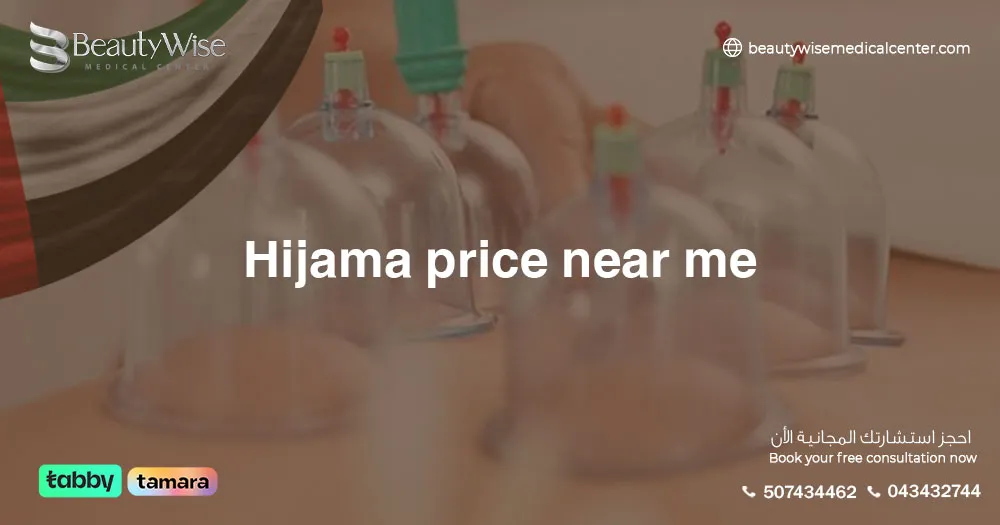Hijama, or cupping therapy, is an ancient treatment that existed in many cultures and it’s known for its ability to improve blood flow, remove toxins from the body, and reduce chronic pain.
It’s a natural procedure that has been used for centuries to improve overall well-being. If you’re searching for Hijama price near me you’ll find that many clinics offer these sessions. At Beauty Wise Medical Center, we offer many types of hijama therapy to make this beneficial practice accessible to everyone.
Table of Contents
Types of hijama
There are many types of hijama, such as wet hijama, dry hijama, running hijama, and flash hijama. The most common two types are wet and dry hijama.
Dry hijama involves adding cups to the skin after they are cleared of air by pumps or flame which creates suction in the skin, the practitioner will leave the cups for a few minutes and then remove them.
Wet hijama involves the same procedure but the practitioner will make small cuts on the skin before adding the cups, this will draw out small amounts of blood.
Running hijama is usually used for massages and the practitioner will add oil or lotion before applying the cups to make the cups easy to move around.
Benefits of hijama
Hijama or cupping has many benefits, including chronic pain relief, reducing toxins in the body, and muscle relaxation. Cupping is also used to improve overall health by removing energy blockages.
For athletes, hijama can help increase blood flow to a specific muscle or area, help reduce pain, and provide natural recovery. Numerous athletes from the Olympics in Rio 2016 used cupping which was seen by the purple marks on some of them.
Who performs hijama
Hijama is most commonly given by massage therapists or acupuncturists. Although they are not required to have specific training to provide cupping therapy, they mostly do. For practitioners to give any treatments, they typically need to hold a license as an acupuncturist or massage therapist.
Hijama is also performed by many practitioners such as physical therapists, chiropractors, occupational therapists, and doctors. All of these health providers are allowed to perform hijama sessions.
Side effects of hijama
After a hijama session, you are expected to have bruises on the skin due to the suction of the blood to the surface, also if you had a wet hijama session you will have cuts on the skin that can take up to ten days to completely heal and there is a very small chance that they leave a scar behind. The risks of the procedure are rare but you might experience dizziness or cold sweats after the session, you might also get burns from heated glass cups in rare cases.
Why is hijama controversial?
The use of hijama is very controversial. Some say that it doesn’t have any medical benefits and it works only as a placebo, a placebo is when you see benefits from a treatment that doesn’t work due to psychological effects, others say it’s more than a placebo and that it works and has many benefits.
Unfortunately, the research done in this area is very low and we’ll need more evidence and research to understand how it actually works.
Who shouldn’t do hijama
Hijama is almost suited for everyone, there are special cases where individuals shouldn’t have hijama sessions, these cases include:
- Children: Hijama depends on the suction of the skin and children under the age of 16 have tender skin, unlike adults, so if children do a hijama session, they are more likely to get injured. Kids are only allowed to do hijama sessions if they are recommended by a doctor and a referral will be needed and they will have to be accompanied by their parents
- Pregnant women: Pregnant women have sensitive bodies and the baby affects the body in many ways and makes it unpredictable. This is why pregnant women should avoid hijama as pressure on the abdomen and lower back can stimulate uterine contractions or affect the baby.
- Patients with skin conditions: Patients with skin conditions such as eczema or open wounds shouldn’t do hijama as the suction from cupping can make the case worse. On the other hand, patients with conditions such as acne will benefit from facial cupping. So you will need to ask the doctor to see if your case needs a hijama.
- Patients with bleeding issues: Due to the suction effect on blood vessels, people with diseases like hemophilia or those using blood-thinning medicine are more likely to have bleeding and bruises after a hijama session.
Read Also: Hijama Cupping Therapy in Dubai.
Hijama price near me
If you are located in the UAE, specifically Dubai, you can search for hijama price near me if you intend to have a hijama session. You will see many places offering this service, including our center which is Beauty Wise Medical Center. We offer many types of hijama such as therapeutic hijama, sports cupping, holistic hijama, and preventive hijama, all of which start at the price of 150 AED.
Read Also: Hijama offers in Dubai.
Bottomline
In conclusion, cupping therapy, also known as hijama, improves blood flow, releases tension, and helps with reducing toxins. It is a safe and natural way that improve your health. Many facilities provide competitive rates if you search for Hijama price near me making this beneficial therapy both available and affordable. For people looking for an easy way to improve their general well-being, it’s a fantastic choice.
Read Also: Hijama Price in Dubai.
Frequently asked questions
Does Hijama really work?
People who have undergone hijama sessions say that it helps with chronic pain as well as sore muscles. There are research papers that say hijama has an anti-inflammatory effect and it reduces toxins in the body. Experts say that more research is needed to know how hijama actually works.
Can Hijama go wrong?
Hijama is considered a safe procedure. The side effects of hijama are little to none, especially if it’s dry hijama. However, you can get scars from hijama and burns, so make sure that the health provider is certified before the procedure.
Who Cannot do Hijama?
Hijama is not suitable for children and pregnant women, also patients with skin diseases and bleeding disorders are not suggested to do hijama. You will need to ask your doctor about hijama sessions and see if they suit your case.




